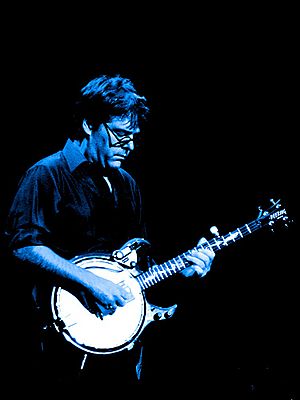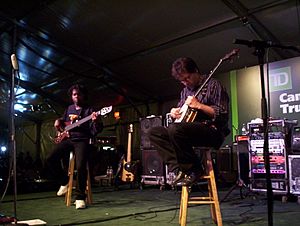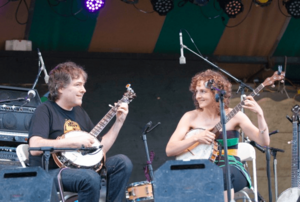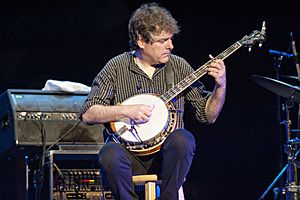Béla Fleck facts for kids
Quick facts for kids
Béla Fleck
|
|
|---|---|

Fleck performing on February 9, 2007
|
|
| Background information | |
| Birth name | Béla Anton Leoš Fleck |
| Born | July 10, 1958 New York City, U.S. |
| Genres | |
| Occupation(s) | Musician, songwriter, composer |
| Instruments | Banjo |
| Years active | 1976–present |
| Labels | Rounder, Warner Bros., Sony Classical, Rhino |
| Associated acts |
|
Béla Anton Leoš Fleck, born on July 10, 1958, is an amazing American banjo player. He is known for being a very skilled and creative musician. Béla has helped make the banjo popular in many types of music. He plays everything from bluegrass and jazz to classical, rock, and world music.
He is most famous for his work with the bands New Grass Revival and Béla Fleck and the Flecktones. Béla Fleck has won an incredible 17 Grammy Awards and has been nominated 39 times. In 2020, he was honored by being added to the International Bluegrass Music Hall of Fame as a member of New Grass Revival.
Contents
Béla Fleck's Early Life and Career
Béla Fleck grew up in New York City. His parents named him after three famous composers: Béla Bartók, Anton Webern, and Leoš Janáček. He became interested in the banjo when he was young. He heard Earl Scruggs play the theme song for The Beverly Hillbillies TV show. He also heard "Dueling Banjos" on the radio.
When he was 15, his grandfather gave him his first banjo. On the way home, a kind stranger helped him tune it. The stranger also suggested he learn from a book by Pete Seeger called How to Play the Five String Banjo. Béla went to the High School of Music & Art in New York City. He played the French horn there for a while. However, he spent most of his time practicing the banjo. He learned from books and took lessons from great banjo players like Tony Trischka.
After high school, Béla moved to New York City. He joined a bluegrass group called Tasty Licks. They recorded two albums together. In 1979, he released his first solo album, Crossing the Tracks. Readers of Frets magazine voted it the Best Overall Album.
Béla Fleck played music on the streets of New York City with bassist Mark Schatz. In 1981, they formed a band called Spectrum with other musicians. That same year, Sam Bush asked Béla to join New Grass Revival. Béla played with New Grass Revival for nine years. In 1987, he released another solo album called Drive. This album was nominated for a Grammy Award for Best Bluegrass Album.
Béla Fleck and the Flecktones

In 1988, Béla Fleck and Victor Wooten started a new band. They called it Béla Fleck and the Flecktones. The band also included keyboardist and harmonica player Howard Levy. Victor's brother, Roy "Future Man" Wooten, played unique synthesizer drums.
The Flecktones recorded many albums. Their second album, Flight of the Cosmic Hippo, became very popular. It reached number one on the Billboard Top Contemporary Jazz Albums chart. This album helped them gain many fans of jazz fusion music.
Howard Levy left the band in 1992. The Flecktones then performed as a trio for a few years. In 1997, saxophonist Jeff Coffin joined them on stage. His first studio album with the band was Left of Cool in 1998. Jeff Coffin left the group in 2008 to join the Dave Matthews Band. Howard Levy returned to the Flecktones in 2009. The original Flecktones recorded Rocket Science and toured together in 2011.
Other Music Projects
Béla Fleck has played banjo on many other projects. He played on the Dave Matthews Band's album Before These Crowded Streets. This included their popular song "Don't Drink the Water."
In 1989, Béla joined a supergroup called Strength in Numbers. This group included other amazing musicians like Sam Bush and Jerry Douglas. They recorded one album called The Telluride Sessions.
In 2001, Béla worked with Edgar Meyer on an album called Perpetual Motion. This album featured classical music played on the banjo. It won two Grammy Awards: Best Instrumental Arrangement and Best Classical Crossover Album.
Béla and Edgar Meyer also wrote a special piece for banjo and bass. They performed it with the Nashville Symphony Orchestra. They later wrote another piece for three instruments. For this, they invited Indian tabla player Zakir Hussain. This piece debuted in Nashville in 2006 and was recorded for the album The Melody of Rhythm.
In 2005, while the Flecktones were taking a break, Béla started new projects. He recorded music with traditional African musicians. He also helped make a documentary about the Flecktones called Bring it Home. He produced his wife's first album, Song of the Traveling Daughter. He also formed a new group called Trio! and recorded an album with the Sparrow Quartet.
Personal Life

Béla Fleck is married to another talented banjo player, Abigail Washburn. They first met in Nashville at a square dance. Béla produced Abigail's first solo album. They have two sons, born in 2013 and 2018.
Media and Festivals
Béla Fleck has appeared on the cover of Making Music magazine. He has also performed at many famous music festivals. These include the High Sierra Music Festival, Telluride Bluegrass Festival, and Newport Folk Festival.
Music Documentary
In 2008, a film called Throw Down Your Heart was released. This movie follows Béla Fleck on his travels to Africa. He meets and plays with some of the best musicians there. He also learns about the African origins of the banjo. The film shows how rich and diverse African music is.
Awards and Nominations
Béla Fleck has won many Grammy Awards. He has won awards with other artists like Asleep at the Wheel, Alison Brown, and Edgar Meyer. He has been nominated in more different music categories than almost any other musician. These categories include country, pop, jazz, bluegrass, classical, folk, and world music.
| Year | Category | Nominated work | Result |
|---|---|---|---|
| 1996 | Best Country Instrumental Performance | "Hightower" (with Asleep at the Wheel and Johnny Gimble) | Won |
| 1997 | Best Pop Instrumental Performance | "The Sinister Minister" (by Béla Fleck and the Flecktones) | Won |
| 1999 | Best Instrumental Composition | "Almost 12" (by Béla Fleck and the Flecktones) | Won |
| 2001 | Best Country Instrumental Performance | "Leaving Cottondale" (with Alison Brown) | Won |
| Best Contemporary Jazz Album | Outbound (by Béla Fleck and the Flecktones) | Won | |
| 2002 | Best Instrumental Arrangement | "Claude Debussy: Doctor Gradus Ad Parnassum" (with Edgar Meyer) | Won |
| Best Classical Crossover Album | Perpetual Motion | Won | |
| 2007 | Best Contemporary Jazz Album | The Hidden Land (by Béla Fleck and the Flecktones) | Won |
| 2009 | Best Pop Instrumental Album | Jingle All the Way (by Béla Fleck and the Flecktones) | Won |
| 2010 | Best Pop Instrumental Performance | "Throw Down Your Heart" | Won |
| Best Contemporary World Music Album | Throw Down Your Heart: Tales from the Acoustic Planet, Vol. 3 - Africa Sessions | Won | |
| 2011 | Best Contemporary World Music Album | Throw Down Your Heart: Africa Sessions Part 2: Unreleased Tracks | Won |
| 2012 | Best Instrumental Composition | "Life in Eleven" (with Howard Levy) | Won |
| 2016 | Best Folk Album | Béla Fleck And Abigail Washburn (with Abigail Washburn) | Won |
| 2022 | Best Bluegrass Album | My Bluegrass Heart | Won |
| 2024 | Best Contemporary Instrumental Album | As We Speak (with Edgar Meyer & Zakir Hussain) | Won |
| 2024 | Best Global Music Performance | "Pashto" (with Edgar Meyer & Zakir Hussain) | Won |
See also
 In Spanish: Béla Fleck para niños
In Spanish: Béla Fleck para niños


